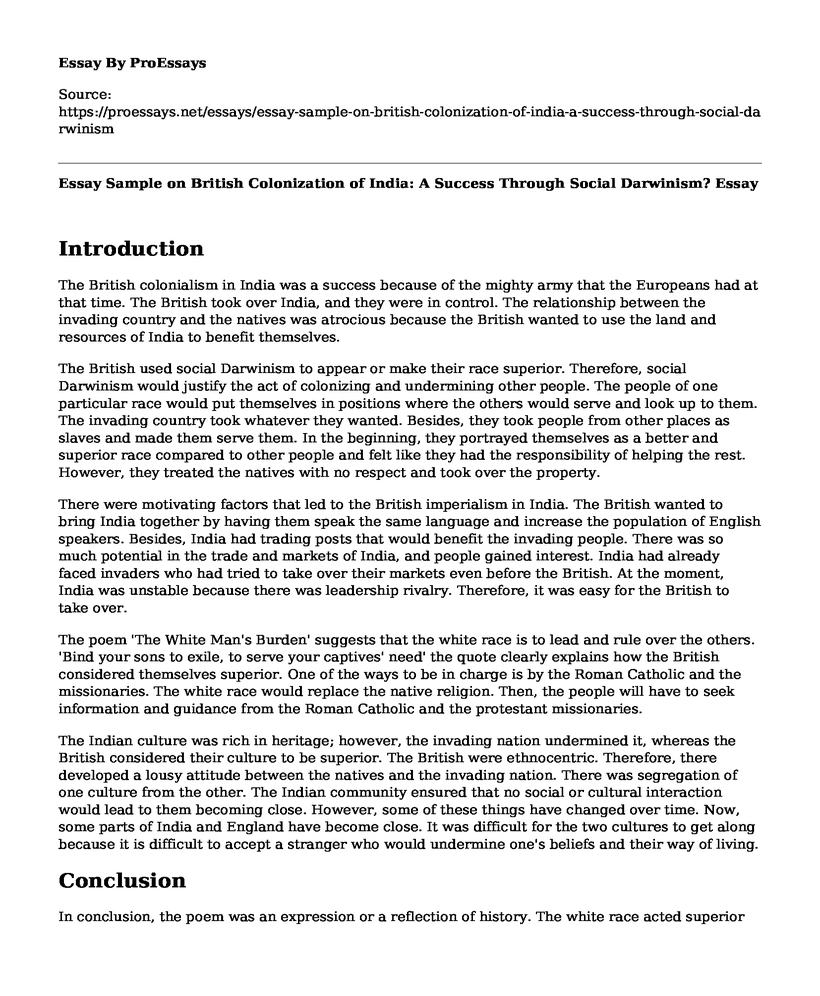Introduction
The British colonialism in India was a success because of the mighty army that the Europeans had at that time. The British took over India, and they were in control. The relationship between the invading country and the natives was atrocious because the British wanted to use the land and resources of India to benefit themselves.
The British used social Darwinism to appear or make their race superior. Therefore, social Darwinism would justify the act of colonizing and undermining other people. The people of one particular race would put themselves in positions where the others would serve and look up to them. The invading country took whatever they wanted. Besides, they took people from other places as slaves and made them serve them. In the beginning, they portrayed themselves as a better and superior race compared to other people and felt like they had the responsibility of helping the rest. However, they treated the natives with no respect and took over the property.
There were motivating factors that led to the British imperialism in India. The British wanted to bring India together by having them speak the same language and increase the population of English speakers. Besides, India had trading posts that would benefit the invading people. There was so much potential in the trade and markets of India, and people gained interest. India had already faced invaders who had tried to take over their markets even before the British. At the moment, India was unstable because there was leadership rivalry. Therefore, it was easy for the British to take over.
The poem 'The White Man's Burden' suggests that the white race is to lead and rule over the others. 'Bind your sons to exile, to serve your captives' need' the quote clearly explains how the British considered themselves superior. One of the ways to be in charge is by the Roman Catholic and the missionaries. The white race would replace the native religion. Then, the people will have to seek information and guidance from the Roman Catholic and the protestant missionaries.
The Indian culture was rich in heritage; however, the invading nation undermined it, whereas the British considered their culture to be superior. The British were ethnocentric. Therefore, there developed a lousy attitude between the natives and the invading nation. There was segregation of one culture from the other. The Indian community ensured that no social or cultural interaction would lead to them becoming close. However, some of these things have changed over time. Now, some parts of India and England have become close. It was difficult for the two cultures to get along because it is difficult to accept a stranger who would undermine one's beliefs and their way of living.
Conclusion
In conclusion, the poem was an expression or a reflection of history. The white race acted superior to take advantage of other people and benefit from their lands and efforts. Problems such as ethnocentrism may occur at local levels. Therefore, it is not only a term for the colonization period. There are the present-day politics that bring along ethnocentrism. There are positive effects of British imperialism in India. There were the construction and growth of the railway network, development of schools and colleges, and building of dams, bridges, roads, and dams.
Cite this page
Essay Sample on British Colonization of India: A Success Through Social Darwinism?. (2023, Mar 26). Retrieved from https://proessays.net/essays/essay-sample-on-british-colonization-of-india-a-success-through-social-darwinism
If you are the original author of this essay and no longer wish to have it published on the ProEssays website, please click below to request its removal:
- Education Is the Secret Key: Essay Sample
- Essay Sample on Mars Colonization
- Biography of Charles the First Essay Example
- Two Views of the Great Depression (1932) Essay Example
- Causes and Consequences of the French Indian War - Essay Sample
- Research Paper on The El Salvadoran Civil War: Historical Context and Events
- Research Paper on Cold War: A Historical Analysis of its Causes and Effects







